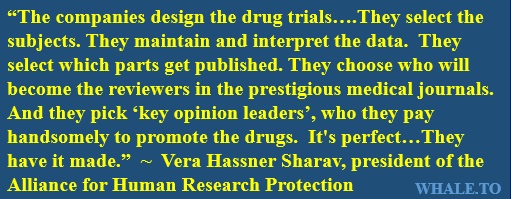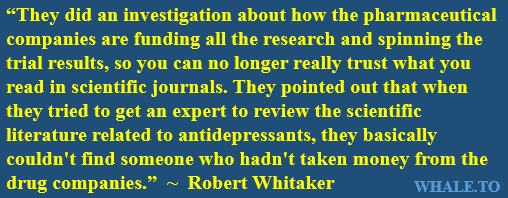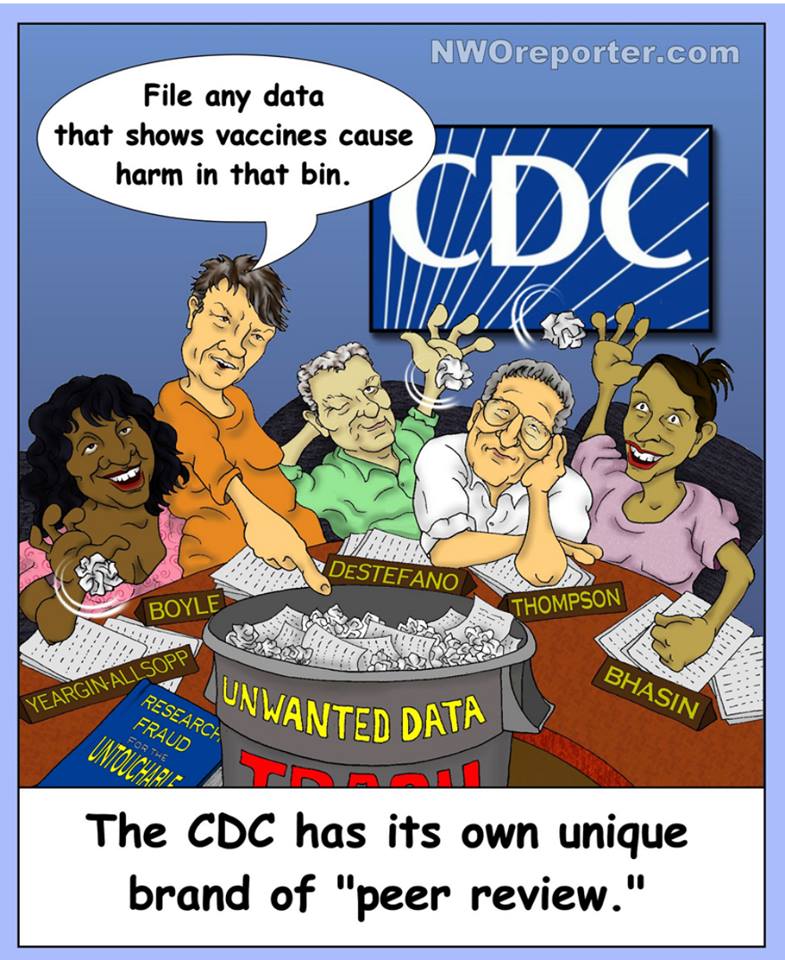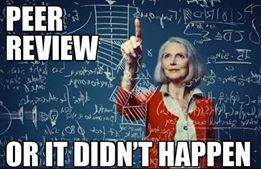Journal article & peer review (original) (raw)
Journal article & peer review Medical control ploys [back] Medical study ploys
"For the public ever to break command science it must first understand the basis of its enormous powers. The medical establishment derives these powers from three sources:(1) enforced consensus through peer review, (2) through commercialization, and (3) the fear of disease, particularly infectious disease."--Peter Deusberg (Inventing The AIDS Virus) www.duesberg.com
[An important part of how the medical cartel controls medicine is by **controlling peer review** and propagating the belief that **any medicine that isn't peer reviewed has no value**. Any amount offraudulent or junk science can then be published to suppress medicine such as laetrile.]
See: Clinical Trials
You Can�t Find the Truth About Vaccines by Burying Your Head in Peer-Reviewed Studies
[2012 Feb] Conflicts of Interest in Vaccine Safety Research Medical journals: "Few consequences seem to be in place for authors who do not declare COls, and at least one major medical journal, Journal of the American Medical Association (JAMA), has modified its policy to make the investigation of COls less transparent (DeAngelis and Fontanarosa, 2009). Medical journal authors' ties to vaccine manufacturers are pervasive, as revealed in a review of authors of vaccine safety articles published in top journals. Even on the peer-reviewed side of things, it has been said that the journals are the marketing arm of the pharmaceutical industry. That is not untrue. To a large extent, that is true. (UKHC Science and Technology Committee, 2011)"
[2011 Oct] Shock vaccine study reveals influenza vaccines only prevent the flu in 1.5 out of 100 adults (not 60% as you've been told) The "60% effectiveness" claim is a total lie
[2010 Nov] Lies, Damned Lies, and Medical ScienceHe charges that as much as 90 percent of the published medical information that doctors rely on is flawed......he worries that the field of medical research is so pervasively flawed, and so riddled with conflicts of interest, that it might be chronically resistant to change�or even to publicly admitting that there�s a problem.
[2010 Aug] Problems with Peers
[Humour] Sample Cover Letter for Journal Manuscript Resubmissions
Journal of Orthomolecular Medicine
[2010 March] Joan Cranmer�s Fateful Decisions and the Suppression of Autism Science By Mark Blaxill
[2009 Oct] Bracing Ourselves for More Sham Vaccine Studies by Richard Gale and Gary Null
JOURNAL OF ORTHOMOLECULAR MEDICINE ONLINE, BUT NOT ON MEDLINE The Journal of Orthomolecular Medicine, although in publication for 38 years, has never been listed on the government database MEDLINE.
Medical Veritas: The Journal of Medical Truth
The Gillberg affair and the fall of a scientific journal (JAACAP) �Such behavior on the part of a journal editor is also unfair to the many authors who have published respectable and legitimate science within their pages. It means that all manuscripts published in JAACAP should be viewed with suspicion. It is also unfair to the many psychiatrists and psychologists who are involved in honest clinical practice, and whose profession has been brought into disrepute. What exactly is the function of a scientific journal beyond serving as a laundering operation?�
[Peer review] Something Rotten at the Core of Science? by David F. HorrobinA recent U.S. Supreme Court decision and an analysis of the peer review system substantiate complaints about this fundamental aspect of scientific research. Far from filtering out junk science, peer review may be blocking the flow of innovation and corrupting public support of science.
Three myths about peer review �Myth number 1: Scientists have always used peer review Myth number 2: peer review is reliable Myth number 3: Peer review is the way we determine what�s right and wrong in science






Quotes Tom Jefferson, from the Cochrane Collaboration�s Methods Group interviewed by the Guardian (UK) in January this year (2003). He said: �If peer review were a medicine it would never get a licence�We had great difficulty in finding any real hard evidence of the system�s effectiveness, which is disappointing, as peer review is the cornerstone of editorial policies worldwide�
[2012 Feb] Conflicts of Interest in Vaccine Safety Research Medical journals: "Few consequences seem to be in place for authors who do not declare COls, and at least one major medical journal, Journal of the American Medical Association (JAMA), has modified its policy to make the investigation of COls less transparent (DeAngelis and Fontanarosa, 2009). Medical journal authors' ties to vaccine manufacturers are pervasive, as revealed in a review of authors of vaccine safety articles published in top journals. Even on the peer-reviewed side of things, it has been said that the journals are the marketing arm of the pharmaceutical industry. That is not untrue. To a large extent, that is true. (UKHC Science and Technology Committee, 2011)"
Though scientists and science journalists are constantly talking up the value of the peer-review process, researchers admit among themselves that biased, erroneous, and even blatantly fraudulent studies easily slip through it.Nature, the grande dame of science journals, stated in a 2006 editorial, �Scientists understand that peer review per se provides only a minimal assurance of quality, and that the public conception of peer review as a stamp of authentication is far from the truth.� What�s more, the peer-review process often pressures researchers to shy away from striking out in genuinely new directions, and instead to build on the findings of their colleagues (that is, their potential reviewers) in ways that only seem like breakthroughs�as with the exciting-sounding gene linkages (autism genes identified!) and nutritional findings (olive oil lowers blood pressure!) that are really just dubious and conflicting variations on a theme.[2010 Nov] Lies, Damned Lies, and Medical Science
They did an investigation about how the pharmaceutical companies are funding all the research and spinning the trial results, so you can no longer really trust what you read in scientific journals. They pointed out that when they tried to get an expert to review the scientific literature related to antidepressants, they basically couldn't find someone who hadn't taken money from the drug companies. Psychiatric Drugs: An Assault on the Human Condition Street Spirit Interview with Robert Whitaker
Professional medicine reporting has no doubt tainted the once respected scientific method. Today, drug companies utilize a large majority of their profits to pay for and design their own studies. Additionally, "ghost writers" are hired to write favorable reviews of drugs despite their known dangers. These reviews are published in peer reviewed medical journals, which are used by medical doctors to get information on FDA approved drugs. Ultimately, doctors are hoodwinked into thinking that a given drug is safe and effective when, in reality, it poses great risk without benefit. [2006] Interview ofShane Ellisonauthor of Health Myths Exposed
"Vera Hassner Sharav, president of the Alliance for Human Research Protection, has been warning about such powers for years. The companies design the drug trials," Sharav says. "They select the subjects. They maintain and interpret the data. They select which parts get published. They choose who will become the reviewers in the prestigious medical journals. And they pick 'key opinion leaders,' who they pay handsomely" to promote the drugs. "It's perfect," she concludes. "They have it made."----Merck Move Shows Industry Adrift
Peer review justicehttp://www.peerreview.org/
"I'll give you an example. This is the New England Journal of Medicine......Eighty-three percent of its revenues comes from drug advertising. What do you think this costs? Eighty-three percent of its revenues comes from drug advertising."--Dr Levin MD http://www.consultclarity.com/blazing/levin.html
"Pediatrics, the AAP's magazine, published an attack on a previous mercury-in-vaccine/autism study that was not peer reviewed, then they refused to publish a scientific refutation of that unfounded attack," Blaxill explained as one example of this growing bias. "It is hard to fathom why Pediatrics would perpetuate research that has been scientifically proven faulty."[Aug 2004] Medical Journal Editorial Bias Deceives Doctors, Leads to Bad Medicine
A recent U.S. Supreme Court decision and an analysis of the peer review system substantiate complaints about this fundamental aspect of scientific research. Far from filtering out junk science, peer review may be blocking the flow of innovation and corrupting public support of science. [Peer review] Something Rotten at the Core of Science? by David F. Horrobin
Is medical science so badly organised that most of the results of their clinical trials are invalid? To answer this question I quote from an editorial in the British Medical Journal in October 1991:
"Where is the Wisdom...? The poverty of medical evidence" "�only about 15% of medical interventions are supported by solid scientific evidence� ...This is partly because only 1% of the articles in medical journals are scientifically sound".
For cancer the figure is about 6%, not 15%. How is it that the peer review system, that determines which scientific papers are of sufficient quality to warrant publication, lets all these unsound papers through? To answer this question I quote from Tom Jefferson, from the Cochrane Collaboration�s Methods Group interviewed by the Guardian (UK) in January this year. He said:"If peer review were a medicine it would never get a licence�We had great difficulty in finding any real hard evidence of the system�s effectiveness, which is disappointing, as peer review is the cornerstone of editorial policies worldwide�. "An Assessment of Orthodox Treatments of Cancer" by Don Benjamin
Cawadias (1953) has said that "the history of medicine has shown that, whenever medicine has strayed from clinical observation, the result has been chaos, stagnation, and disaster."--British Medical Journal, Oct 8th, 1955, p.867(Quoted in Clinical Medical Discoveries by Beddow Bayly)
"I document the way editors have skewed and prejudiced scientific discourse and obstructed the usual self-correcting mechanisms of science. In 1995 and 1996 I gathered systematic evidence of suppression and manipulation of letters to the editors in some of the major international scientific journals such as _Science, Nature, Chemical and Engineering News, the Lancet, and the New York Times."--_From the book "Challenges" by Serge Lang of Yale University, Springer-Verlag, 1998 ISBN 0-387-94861-9 http://www.duesberg.com/viewpoints/hivcase-content.html
"One feels rage as well at the complicity of the "peer reviewed" journals which print these awful productions. It is abundantly clear, if further proof were needed, that "peer review" means simply preventing criticism of certain commercial interests and blocking the emergence of competing viewpoints. Finally, one feels rage and exasperation at the total inability of journalists -- who are reputed to be professional sceptics -- to see through, and expose, this duplicity."--Harris Coulterhttp://www.healthy.net/library/articles/coulter/critique.htm
"Although the rationale for peer review is quality control, it's obvious that the process can be used to suppress dissent. It's a powerful method: peer review can be used to block publications, appointments, promotions and grants. Most importantly, it is very difficult to demonstrate that bias is involved. Usually referees are anonymous: only their reports are made available. Members of selection committees carry out their deliberations in secret: only a decision and perhaps a brief justification is needed."---Brian Martin http://www.uow.edu.au/arts/sts/bmartin/dissent/documents/ss/ss5.html
"Most patients probably assume that when a doctor proposes to use an established treatment to conquer a disease he will be using a treatment which has been tested, examined and proven. But this is not the case. The savage truth is that most medical research is organised, paid for, commissioned or subsidised by the drug industry (and the food, tobacco and alcohol industries). This type of research is designed, quite simply, to find evidence showing a new product is of commercial value. The companies which commission such research are not terribly bothered about evidence; what they are looking for are conclusions which will enable them to sell their product. Drug company sponsored research is done more to get good reviews than to find out the truth."----Dr Vernon Coleman
"It used to be that drug companies simply gave grants to academic medical centres for the use of their clinical researchers to do a study and that was it. It was at arm's length. The researcher did a study and he or she published the results, whatever those results would be. Now, it's very, very different. The drug companies increasingly design the studies. They keep the data. They don't even let the researchers see the data. They analyse the data. They decide whether they're going to even publish the data at the end of it. They sign contracts with researchers and with academic medical centres saying that they don't get to publish their work unless they get permission from the drug company. So, you can see that the distortion starts even before publication. It starts in determining what's going to be published and what isn't going to be published. This is no longer arm's length. It's treating the researchers and the academic medical centres as though they were hired guns or technicians or something. They just do the work. And the drug company will decide what the data show, what the conclusions are and whether it will even be published."------Dr Marcia Angell, former editor of the New England Journal of Medicine http://www.abc.net.au/lateline/s160431.htm
"Carolyn Morelli, co-founder of Pennsylvania Parents for Vaccine Awareness, asserts that authors of medical literature should make full financial disclosure concerning all sources of income—including that from consulting, and income in the form of gifts or other favors from pharmaceutical companies such as Merck, Sharpe and Dohme, makers of the MMR vaccine."---Laura Ruede
"In a survey of North American medical journal editors published in 1995, Wilkes and [Kravitz.sup.11] reported that 26% of responding editors required authors to reveal sources of their funding, 28% required disclosure of all institutional affiliations, and 13% and 10%, respectively, required disclosure of consultant positions and of stock ownership in companies that may pose a conflict of interest. This lack of editorial unanimity was revealed in the same year the nation's 2 leading funding agencies, the National Institutes of [Health.sup.12] and the National Science [Foundation.sup.13], issued conflict-of-interest regulations requiring disclosure by researchers to their host institutions of financial interests in connection with grant proposals." Financial Interest and Its Disclosure in Scientific Publications. JAMA, The Journal of the American Medical Association, July 15, 1998 v280 n3 p225(1) Author Krimsky, Sheldon PhD; Rothenberg, L. S. JD
A study of 1,000 scientists who published their findings in major scientific journals shows at least a third had a financial stake in their research. http://www.usatoday.com/life/health/hcare/docs/lhhdo007.htm
A study of journal publications details investigators' financial interests in their research http://www.sciam.com/explorations/031797funding/031797stix.html
FOLLOW THE MONEY http://www.monitor.net/rachel/r581.html
Examples of peer review rationalisation [See Rationalization.]If I am wrong and anyone can point to a peer reviewed and accepted piece of clinical research that proves the point I would be happy to read it, but as far as I am aware it does not exist.
"Yet, the fact remains that mercury fears ARE unfounded. If I am incorrect, please provide peer-reviewed evidence to the contrary." Putz the pharma shill
Are any of these peer reviewed?
ad infinitum....
BMJ editorial:
http://www.bmj.com/cgi/content/full/319/7211/653
The interesting paragraph within the editorial:
"Overwhelming evidence exists that single source sponsorship is associated with outcomes favourable to the sponsor's product.2-4 Although most documentation of industry influence on research concerns the pharmaceutical and tobacco industries, other types of corporate sponsors are also known to influence research reports. 5 6 One reason why published research favours the sponsor's product is because sponsors sometimes suppress publication of unfavourable findings.7 Single source sponsorship can also influence decisions, such as prescribing decisions, that are more directly related to patient care.8 In addition to the empirical data on the influences of industry sponsorship, doctors' acceptance of money and gifts from corporate sponsors creates a relationship with the sponsor. Doctors may then feel favourable towards, or even obligated to, that sponsor. 9 10"
Ehrengut W, "Bias in evaluating CNS complications following pertussis immunization." Acta Paediatr Jpn, 1991 Aug; 33(4):421-427. Ehrengut W at Institute of Vaccinology and Virology, Hamburg, Germany states, "Bias in the evaluation of CNS complications following pertussis immunization are the following: 1) Notifications of post-immunization adverse events, 2) Publications by vaccine producers on the frequency of adverse reactions, 3) Comparison of permanent brain damage after DPT and DT immunization, 4) Pro-immunization, 5) Immunization associated viral encephalitis, 6) Accuracy of statistics, 7) Personal. A review of these points indicates an underestimation of CNS complications after pertussis immunization."
http://www.bmj.com/cgi/content/full/319/7221/1321
British Medical Journal
BMJ 1999;319:1321 ( 20 November )
News
Medical societies accused of being beholden to the drugs industry
Scott Gottlieb , New York
Some prestigious medical organisations are coming under criticism for being too
beholden to the pharmaceutical industry for their income.
In a study published in the Western Journal of Medicine Dr Peter Glassman, of the
University of California in Los Angeles, and colleagues charged that the increasing
reliance of doctors' organisations on pharmaceutical advertising is placing the
medical organisations in jeopardy of losing their objectivity.
In their study the authors evaluated the primary clinical journals of several leading medical organisations, including the Journal of the American College of Cardiology, Annals of Internal Medicine, Journal of the American Medical Association, American Journal of Respiratory and Critical Care Medicine, Clinical Infectious Diseases, and the New England Journal of Medicine.
They found that the estimated revenue from pharmaceutical advertising ranged from 715000(�450000)to715000 (�450000) to 715000(�450000)to18ma total that they said could place the organisations in a position of dependency. Five organisations raised more than 10%of their gross income from a single journal's pharmaceutical advertising, and four organisations raised as much or more from pharmaceutical advertising as from members (Western Journal of Medicine 1999;171:234-9).
In a separate article published in the Los Angeles Times on 21 October 1999, reporter Terence Monmaney charged that the New England Journal of Medicine had violated its own ethics policy numerous times in the past three years. It did so by publishing articles by researchers with drug company ties and not disclosing the potential conflicts of interest.
A similar report was published in the New England Journal of Medicine; this found that almost every scientist defending the safety of calcium channel antagonists (whose use is sometimes controversial) had unpublished financial ties to manufacturers of these drugs (1998;338:101-6).
"We believe much more explicit disclosure procedures should be used for written publications," said Dr Allan Detsky, professor of health administration and medicine at the University of Toronto and one of the authors of the New England Journal's study.
"Right now, almost all journals will ask for disclosure, but it's done in a relatively loose way, letting the authors write down anything they want," he added.
In Mr Monmaney's report published in the Los Angeles Times, an analysis of 36 "drug therapy" review articles published in the New England Journal of Medicine since 1997 identified eight articles by researchers with undisclosed financial links to drug companies that marketed treatments evaluated in the articles.
Among the articles questioned was a 1997 review of treatments for multiple sclerosis in which the lead author of the study had received research funds and speaking fees from multiple companies that make drugs assessed in the article (according to the Los Angeles Times).
The newspaper also reported that the sole author of a 1998 review of breast cancer treatments belatedly said that he had received consulting fees from multiple companies that make drugs assessed in the article.
The Los Angeles Times conducted the analysis after it was widely reported in September that the New England Journal of Medicine ran a review of treatments for hair loss by a researcher alleged to have undisclosed financial ties to the pharmaceutical companies that market the hair loss treatments Rogaine and Propecia. (1999;341:964-9). The lead author of that study, Dr Vera Price, professor of clinical dermatology at the University of California in San Francisco, served as a paid consultant to the drugs'
manufacturers.
According to the Los Angeles Times, she did not disclose these ties to the NEJM, but Dr Price has said on the journal's website that she did so verbally to the commissioning editor.
The Western Journal of Medicine is owned by the BMJ Publishing Group.
� British Medical Journal 1999
Newsweek
Is Science Censored?
Ideology may influence what studies get published.
excerpted from Sept. 1992 issue
..This is how science works? Despite its objective face, science is as
shot through with ideology as any political campaign, and now that
dirty secret is coming out. The party line is that papers submitted to
journals are rejected only for reasons of substance-the methodology is
suspect, the data don't support the conclusions, the journal has better
papers to use. But lately scientists have been privately fuming over
rejections they blame on censorship. And this summer, the issue
exploded in public.
One leading cancer journal, for instance, recently published an
industry study concluding that the fluoride added to drinking water
does not increase the risk of cancer in lab animals. That same journal
rejected a government study, by researchers at the National Institute
of Environmental Health Sciences, that reported an increase in rare
bone cancers among male rats fed fluoride. The journal explained that
it does not publish lab-animal studies anymore. "No one wants to touch
this," says toxicologist James Huff of NIEHS about the persistent
evidence that fluoride poses some hazard.
Chalmers hasn't made many friends at science journals by opening this
debate, but some researchers applaud him. " He's made statements about
something that is very, very disturbing," said toxicologist Ellen
Silbergeld of the University of Maryland. "[Suppression of studies] is
particularly vicious when they concern public-health issues." But the
risk that censorship poses to public health may be the least of it. If
science loses its reputation for probity, its conclusions will carry no
more weight than any interest group's.
Sharon Begley
Typical Pharma attitude beloved of pharma trolls:
